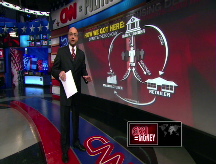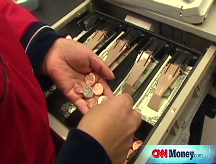Pending home sales sink to 7-year low
The number of homes under contract to be sold dipped 4% in November, amid mounting job losses and weak consumer confidence.
NEW YORK (CNNMoney.com) -- The number of homes under contract to be sold fell 4% in November, according to a report released Tuesday.
The Pending Home Sales Index fell 4% to 82.3 for the month of November, to its lowest level since the series began in 2001, according to the National Association of Realtors (NAR). That's a drop from a downwardly revised reading of 85.7 in the month of October.
The November index is 5.3% below the same month a year ago, when the Index stood at 86.9.
A combination of factors kept home buyers side-lined, according to Mike Larson, real estate analyst at Weiss Research. "You have the recession, rising unemployment, slumping consumer confidence and tighter mortgage standards are the icing on the cake," he said.
The reading of pending home sales is a forward-looking index that tracks when sales contracts are signed but a deal has yet to be closed. Sales are typically finalized within one or two months of signing the contract.
However, one analyst cautioned that a signed contract does not necessarily translate into a final sale these days, given the current market turmoil.
Some potential home buyers may sign a contract but then can't get a mortgage due to stricter lending standards, said Patrick Newport, economist with IHS Global Insight.
Other people may have signed the initial papers and then changed their minds because the economic outlook has deteriorated so much," he added.
Even as home prices have fallen to record lows, the recession has certainly stopped plenty of other buyers from even thinking about making a move.
"December's housing market activity could be comparably lower due to ongoing problems in the economy, so a real estate-focused stimulus plan [from the government] is urgently needed," NAR chief economist Lawrence Yun said in a written statement.
Mortgage rates: November's pending sales activity does not reflect the 37-year lows that mortgage rates hit in December. The average 30-year, fixed-rate loan declined to 5.1%, with 0.7 up-front points, for the week ending December 31, according to Freddie Mac (FRE, Fortune 500).
But so far, the dip in mortgage rates has primarily caused a spike in mortgage refinancing, rather than in new home sales, according to Newport.
"I don't think [low mortgage rates] will have that much of an impact on sales - it will have some impact - but not that much," he added.
NAR President Charles McMillan, a broker with Coldwell Banker Residential Brokerage in Dallas-Fort Worth disagrees. He urged Congress to provide stimulus for the housing market so that home buyers can take advantage of the drastically reduced home mortgage rates.
"It's crucial for Congress and the new administration to move quickly to remove impediments and offer home buyers the incentives they need to tap into today's historic low mortgage interest rates," he said.
NAR expects the 30 year fixed rate to hold fairly steady through the first half of 2009, but then to rise slightly in the second half of the year.
Regional breakdown: Pending home sales across all regions were down from October to November. But sales in the West were actually up significantly from November 2007.
The pending home sales index fell 7.2% to 63.2 in the Northeast and stood 14.6% below its November 2007 levels. In the Midwest, the index slipped 6.7% to 74.2 and was down 10.1% year-over-year. In the South month-to-month losses were more modest, with the pending home sales index down 2.2% to 85.3, but it was off 12.7% from a year ago.
In the West, however, while the index was down 2.4% in the month to 101.2, pending sales jumped 19.3% from November 2007. That sales increase is due to the dramatic drop in home prices in states like California, Arizona and Nevada, which has spurred new deals, according to Larson.
"You are having a lot of foreclosures in those three states and banks are just cutting the prices until those homes sell," added Newport.
Despite a flurry of activity in the West, Larson warned that the housing market recovery would be slow and gradual. "We still have a much higher level of inventory than usual," he said, "and it will take quite some time to chew through some of that overhang." ![]()




